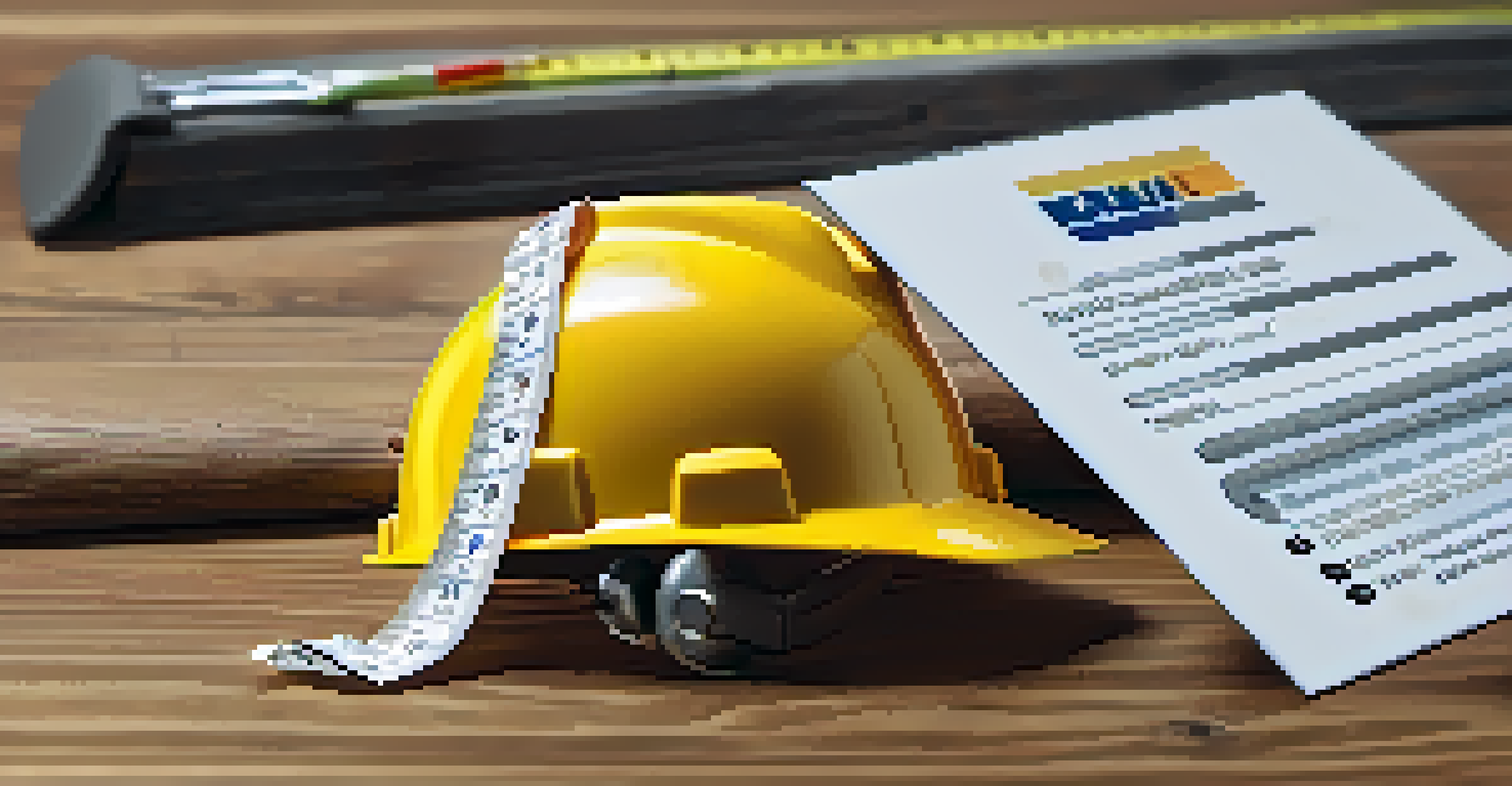Checking Contractor Licensing and Bonding Requirements

Understanding Contractor Licensing: Why It Matters
Contractor licensing is a crucial step in ensuring that the professionals you hire are qualified to perform their work. Licensing requirements vary by state, but they typically involve passing exams, demonstrating experience, and adhering to industry standards. By hiring a licensed contractor, you're not only ensuring quality work but also protecting yourself from potential legal issues.
Quality is not an act, it is a habit.
Think of licensing as a badge of competence; it signifies that the contractor has met certain educational and professional criteria. For example, a licensed electrician has proven their knowledge of electrical codes and safety practices, which is essential for any electrical work in your home. This added layer of assurance can save you from headaches down the line.
Furthermore, a licensed contractor is often required to carry insurance and bonding, which adds another level of protection for you as a homeowner. This means that if something goes wrong during the project, you have recourse to address potential damages or issues. In short, checking a contractor's licensing is a fundamental first step in your hiring process.
How to Verify a Contractor's License
To verify a contractor's license, start by visiting your state's licensing board website. Most states have a searchable database where you can enter the contractor's name or license number to check their status. This process is typically straightforward and can be done in just a few minutes, giving you peace of mind before proceeding with any agreements.

When you find the contractor's information, look for details such as the license type, expiration date, and any disciplinary actions. This transparency is vital, as it can indicate the contractor's reliability and professionalism. If you encounter a contractor without a valid license, it's a red flag that shouldn't be ignored.
Verify Contractor Licensing First
Always check a contractor's licensing status to ensure they are qualified and legally compliant.
In addition to checking the license, consider asking the contractor for proof of their license during your initial discussions. A reputable contractor will be more than happy to provide this information. By taking these steps, you're setting the stage for a successful project with a qualified professional.
The Importance of Bonding in Contracting Work
Bonding is an essential aspect of contractor work that protects homeowners from potential financial loss. A contractor's bond serves as a form of insurance that ensures they will complete the project as agreed, adhere to local laws, and pay their subcontractors and suppliers. If the contractor fails to fulfill their obligations, the bond can be used to cover any damages or losses incurred.
The bitterness of poor quality remains long after the sweetness of low price is forgotten.
Imagine you're planning a major renovation. You’ve hired a contractor who is bonded, which means you have some financial security in case they don't deliver as promised. If they abandon the project or fail to pay their workers, you can file a claim against their bond to recover your losses. This safety net is especially important for larger projects where the risks are higher.
In many states, bonding is a legal requirement for certain types of contractors, especially in construction. Always ask for proof of bonding when considering a contractor for your project. This simple step can provide you with added reassurance and protect your investment.
How to Check a Contractor's Bonding Status
Checking a contractor's bonding status is vital to ensuring you're protected during your project. You can start by asking the contractor directly for their bond information, including the name of the bonding company and the bond number. Reputable contractors will have no issue providing this information as part of their transparency.
To further verify their bonding status, you can contact the bonding company directly. They can confirm if the bond is active and provide details about the coverage amount. This step not only reassures you of the contractor's legitimacy but also gives you insight into the level of security you have in case of any issues.
Importance of Bonding Explained
A bonded contractor provides financial security, protecting you from potential losses if they fail to fulfill their obligations.
Remember, bonding is not just a checkbox; it's a critical component of contractor reliability. By confirming this information, you're taking proactive steps to safeguard your investment and ensure that your project runs smoothly.
Understanding Insurance: What You Need to Know
Insurance is another critical factor to consider when hiring a contractor. Most reputable contractors carry general liability insurance, which protects you in case of accidents or damages that occur during the project. This type of insurance ensures that if a worker gets injured on your property, you won’t be held liable for their medical expenses.
Additionally, contractors may also have worker's compensation insurance, which is essential for protecting both the contractor and the homeowner. If a worker is injured while working on your project, this insurance covers their medical bills and lost wages without putting you at risk. It's a win-win situation that offers peace of mind.
When discussing insurance with a contractor, ask for proof of coverage and ensure that their policies are up to date. This small step can protect you from unforeseen circumstances and help you feel more secure in your hiring decision.
The Role of Local Regulations in Contractor Requirements
Local regulations play a significant role in determining contractor licensing and bonding requirements. Each state, and often each municipality, has its own set of rules that contractors must follow to operate legally. Understanding these local regulations is crucial for ensuring that you hire a contractor who complies with all necessary laws.
For example, some areas may require specific licenses for trades like plumbing or electrical work, while others might have broader licensing requirements. It's essential to familiarize yourself with your local laws to ensure that the contractor you choose is fully compliant. This knowledge not only protects you but also contributes to the overall safety and quality of your project.
Insurance Offers Essential Protection
Reputable contractors typically carry insurance to safeguard you from liabilities related to accidents or damages during the project.
Before hiring a contractor, consider reaching out to your local building department for guidance on what licenses and bonding are required in your area. This proactive approach can help you make informed decisions and avoid potential pitfalls down the road.
Common Pitfalls to Avoid When Hiring Contractors
When hiring a contractor, several common pitfalls can lead to problems down the road. One of the most significant mistakes is failing to verify a contractor's licensing and bonding status. Skipping this crucial step can result in hiring unqualified individuals, leading to shoddy work or even legal issues if something goes wrong.
Another pitfall is not reviewing contracts carefully before signing. Ensure that all aspects of the project, including timelines, costs, and payment schedules, are clearly outlined in writing. A vague contract can lead to misunderstandings and disputes later on, so take the time to read and ask questions before committing.

Lastly, avoid rushing the hiring process just to get started. Take your time to research multiple contractors, read reviews, and ask for references. A little extra effort upfront can save you from significant headaches and expenses later on, making your project a much smoother experience.
Final Thoughts: Ensuring a Successful Contractor Experience
In conclusion, checking contractor licensing and bonding requirements is essential for ensuring a positive experience during your project. By taking the time to verify these credentials, you can protect yourself from potential risks and ensure that you're hiring a qualified professional. Remember, a well-informed decision is the best kind of decision.
As you embark on your home improvement journey, keep in mind the importance of clear communication with your contractor. Establishing expectations upfront can help foster a positive working relationship and reduce the likelihood of misunderstandings. Don't hesitate to voice your concerns and ask questions throughout the process.
Verify Contractor Licensing First
Checking a contractor's licensing ensures you hire qualified professionals and protects you from legal issues.
Ultimately, a successful contractor experience hinges on preparation and diligence. By following the steps outlined in this guide, you'll be well-equipped to find a trustworthy contractor who can bring your vision to life while safeguarding your interests.